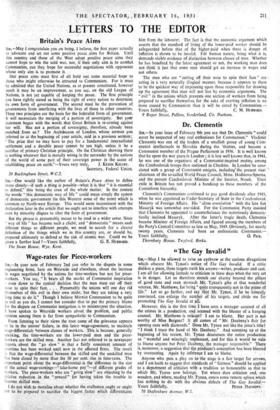Dr. Clementis
SIIL—In your issue of February 9th you say that Dr. Clementis "could never be suspected of any real enthusiasm for Communism." Vladimir Clementis was one of the leaders of a smallish group of young Com- munist intellectuals in Slovakia during the 'thirties, and became a Communist member of the Prague Parliament in 1936. It is well known that he spent the war years in London ; it is less well known that, in 1941, he was one of the organisers of a Communist-inspired mutiny among the Czechoslovak troops then stationed in Cheshire. In London he asso- ciated with a group of Communist emigres, including`the present vice- chairman of the so-called World Peace Council, M me. Hodinova-Spurna, and the present Czechoslovak Minister of the Interior, Nosek. Their exile in Britain has not proved a handicap to these members of the Cominforrn hierarchy.
Clementis's Communism continued to pay good dividends after 1945, when he was appointed as Under-Secretary of State in the Czechoslovak Ministry of Foreign Affairs. His "close association" with the late Ian Masaryk was somewhat one-sided. For the Communist Party insisted that Clementis be appointed to counterbalance the notoriously democra-
tically inclined Masaryk. After the latter's tragic death, Clementis became Minister of Foreign Affairs, and figured among the members of the Party's Central Committee as late as May, 1949. Obviously, for nearly twenty years, Clementis had been an enthusiastic Communist.— Yours faithfully, 0. Pim Thornbury House, Twytord. Berks.


































 Previous page
Previous page